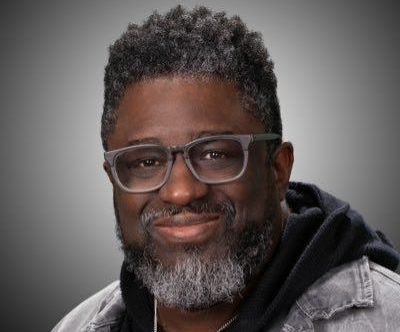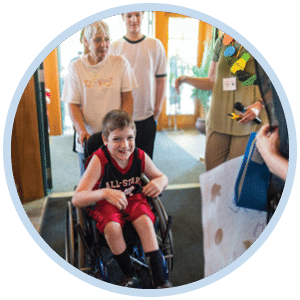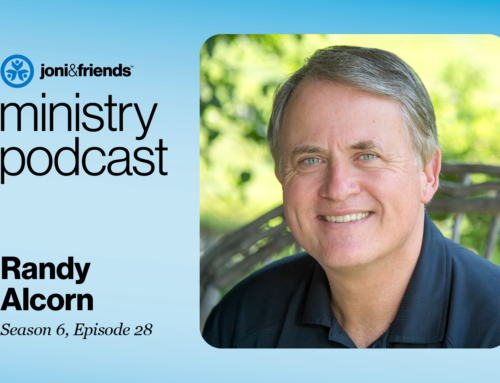Purpose, Identity, and Diversity in the Church
Subscribe to Joni and Friends Ministry Podcast

Pastor Lamar Hardwick returns to the podcast to talk about finding purpose and identity in Christ, and the importance of diversity in the church—all through the lens of disability.
In the last episode of the podcast, Dr. Hardwick shared about his experience growing up with undiagnosed autism and how his diagnosis at age 36 helped him understand himself, others, and his faith in new ways.
What is my purpose?
Not everyone wants to say it out loud, but Pastor Lamar will:
“A lot of us find ourselves tolerating our way through life.”
But Pastor Lamar suggests that finding God-given purpose makes life better and more enjoyable.
For Lamar, getting an autism diagnosis, in conjunction with his calling to ministry, has created a sense of purpose:
“For me it’s being a voice for the disability community. To be one of the many voices that speak up for the inclusion of people with disabilities in leadership and in our faith communities. And to be a voice for including people with disabilities as a matter of justice.
I want to be the type of person that God can call on to stand in the gap. That’s where I’ve found my purpose—sometimes it’s in preaching; sometimes it’s writing, sometimes it’s praying for people.”
Pastor Lamar
And while he used to have questions about his value as a person, he now feels secure in his value—not because of things he can do, but because of his inherent, God-given worth.
“My purpose is not in doing—it’s in being,” says Lamar.
What is my value?
Pastor Lamar wants churches to help people find their God-given purpose. To do this, he raises up the importance of environment. In his book Disability in the Church: A Vision for Diversity and Inclusion, Pastor Lamar unpacks the Parable of the Sower:
“A farmer went out to sow his seed. As he was scattering the seed, some fell along the path, and the birds came and ate it up. Some fell on rocky places, where it did not have much soil. It sprang up quickly, because the soil was shallow. But when the sun came up, the plants were scorched, and they withered because they had no root. Other seed fell among thorns, which grew up and choked the plants. Still other seed fell on good soil, where it produced a crop—a hundred, sixty or thirty times what was sown. Whoever has ears, let them hear.”
Matthew 13:3–9
Pastor Lamar points out that the seeds fall on different types of soil.
Jesus never blames the seed; the seed will do what it’s designed to do if it lands in the right environment. Lamar wants people to understand that, like a seed, every person is born with intrinsic God-given value.

Lamar emphasizes that every person bears the image of God and also has unique DNA, unique opportunities, and a unique calling in the kingdom. And in order to bear fruit, a person needs a conducive environment to grow and flourish—just like seeds need good soil.
As a person with autism and a pastor, Lamar sees that the environments created in many churches fail to cultivate growth in people with disabilities. Making accommodations and adjustments can prove difficult, and change can be seen as a sacrifice. In Lamar’s experience with lack of inclusion in the church, “It’s not necessarily a person’s disability that holds them back. It’s the way the church does things—those proverbial forms that Jesus talks about—that choke out the fruit.”
Lamar encourages church leaders to “hunger and thirst for God’s way of doing things.” When it comes to including people with disabilities, he says,
“Keep the focus on the fruit. Keep the focus on what could happen—not on the cost you man have to incur or the discomfort of change.”
A Vision for Inclusion
To foster belonging, inclusion, and diversity in the church, Pastor Lamar reminds believers that Christians—Jew and Gentile—have been adopted and grafted into God’s family.

“If some of the branches have been broken off, and you, though a wild olive shoot, have been grafted in among the others and now share in the nourishing sap from the olive root, do not consider yourself to be superior to those other branches. If you do, consider this: You do not support the root, but the root supports you.”
Romans 11:17–19
The Apostle Paul wants Christians to remember what it means to be on the outside, then invited in by the grace of God. It makes us more hospitable, more gracious, more humble when we find ourselves “on the inside.” In Ephesians 2, Paul challenges believers with a reminder that nobody deserves God’s mercy:
“As for you, you were dead in your transgressions and sins, in which you used to live … All of us also lived among them at one time, gratifying the cravings of our flesh and following its desires and thoughts. Like the rest, we were by nature deserving of wrath. But because of his great love for us, God, who is rich in mercy, made us alive with Christ even when we were dead in transgressions.”
Ephesians 2:1–5
A posture of humility can make churches and people more gracious and inclusive. In addition, Pastor Lamar points to Jesus as the ultimate host.
“If you read Scripture, it doesn’t matter whose house Jesus is in. He always acts as the host. He’s the one who breaks the bread. With Jesus as host, it’s not our table to exclude anyone from. Jesus gets to decide who is or isn’t included at the table.”
Pastor Lamar

Leading Toward Inclusion
When a church wants to become more inclusive, especially of people with disabilities, Pastor Lamar starts with a question: “Who on the leadership team has a disability?” He asks this question because some of what makes a church inclusive (or not) is subconscious or indirect. A church may not intend to be excusive, but if disabled people don’t have a voice in decisions or creating the practices or environment, they won’t become fully integrated.
“We’re very good at inviting people. We’re not so good at including people.”
Pastor Lamar
The church knows how to invite people into pre-created, pre-determined spaces and programs. Leaders have already decided how long the service will be, how bright or dim the lights will be. But real inclusion means allowing people to shape their spaces and experiences.

“Having people with disabilities on your leadership team can help you shape a truly inclusive space,”
Lamar
You can ask a person who uses a walker if they feel comfortable getting to a seat in the sanctuary. If they need more light, adjust the lights, even if the ambiance has to shift.
Next Steps for Greater Inclusion
For pastors and leaders aiming to include and integrate people with disabilities, Pastor Lamar offers some action items:
- Create a committee or a task force
- Get input from the congregation, especially people living with disability
- Evaluate accessibility of facilities and programs
- Consider how people with various disabilities can contribute to the mission of your church
- Host a respite event for families living with disability
He also gives a word of encouragement:
“You don’t have to tackle everything right away. Find ways to take short-term, measurable action; then build from there.”
Lamar
How can churches share the Gospel with kids and teens on the spectrum?
Pastor Lamar knows how it feels to live with autism as a teenager, and to grapple with faith at the same time. To people wanting to shepherd and share the Gospel with children and teens on the spectrum, he advises plenty of space for listening, questions, and movement of the Holy Sprit.
“Let the questions guide the curriculum, instead of trying to jam a certain amount of information into a [lesson],” says Lamar.
Even if a lesson doesn’t get through the allotted material in a curriculum, leaving room for questions will identify points of hesitation or confusion, and let them feel heard and understood. He also recommends looking into the growing resources and curricula designed to teach neuro-divergent kids, teens, and young adults about God.
Hear how Dr. Hardwick became “The Autism Pastor,” and more of his story.

Become a Church that Embraces People with Disabilities
Joni and Friends provides church training resources to help you welcome and embrace people with disabilities. See how you can start or grow your disability ministry!











